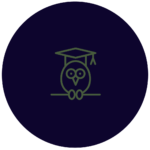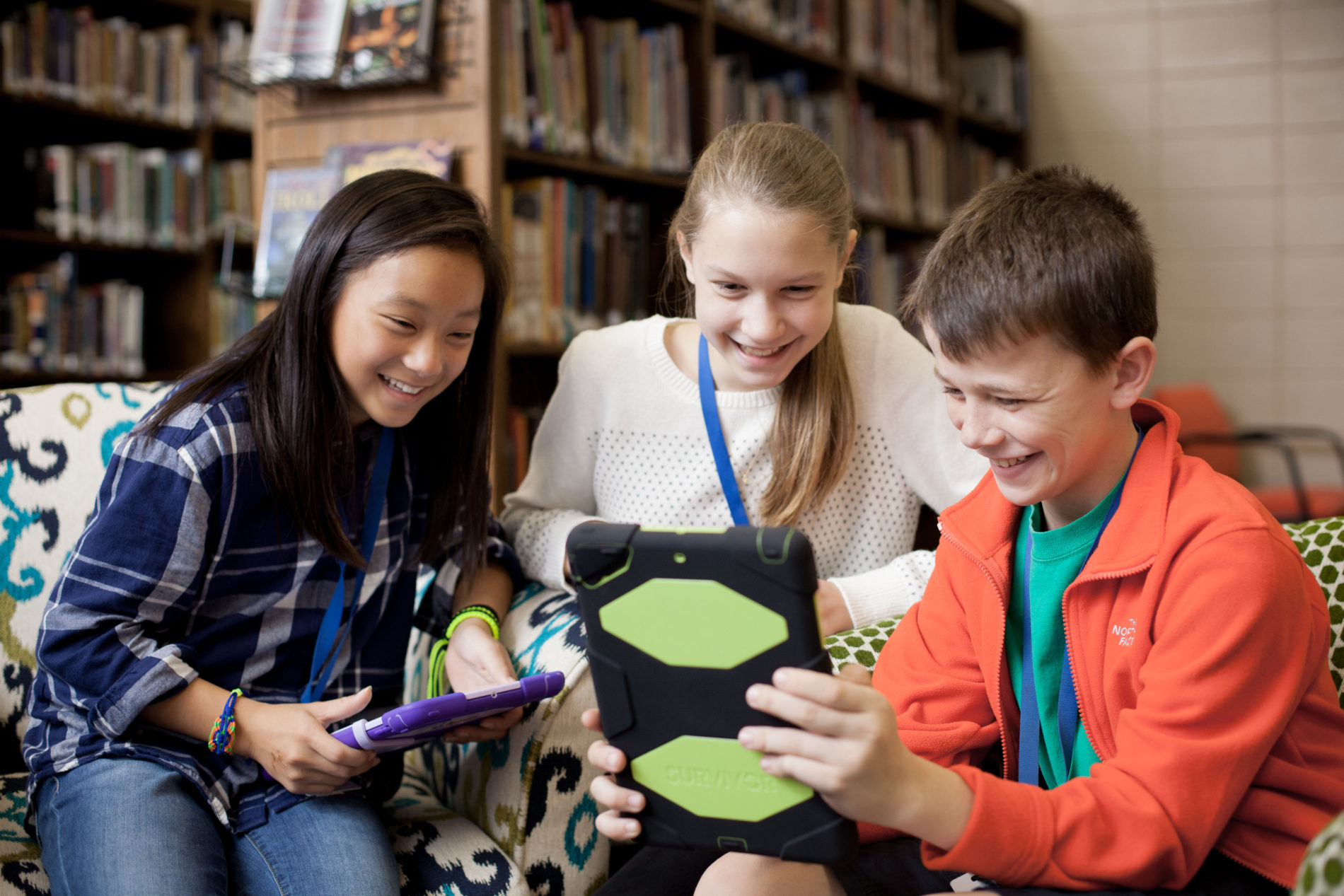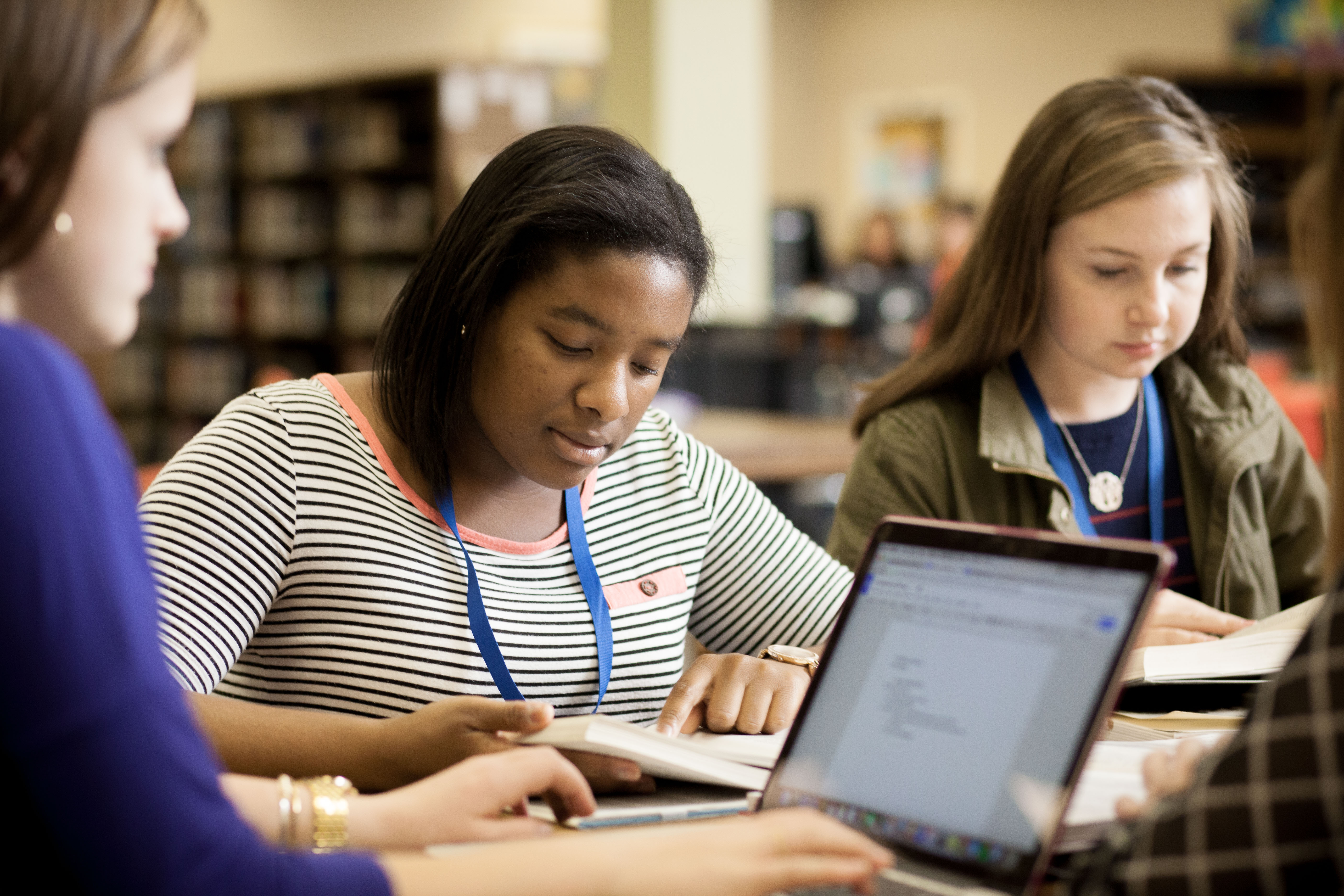Lower School (Grades Preschool – 4)
Because children love to explore and embrace the world using all of their senses, instruction extends beyond the classroom walls. Frequent field trips, special guest speakers, and virtual tours give students firsthand experiences that bring classroom lessons to life.
Discovery and challenge are the hallmarks of the pre-school and lower school programs at Gaston Day. Students and teachers work together to discover new concepts, master skills, learn important facts, and weave them all together into an exciting “tapestry of knowledge.”
Language arts and mathematics provide the basic structure for the academic day. Specific blocks of uninterrupted time are devoted for instruction and mastery in these areas, combining a myriad of activities to allow for individual, small group, and whole class instruction.
Our multisensory approach to education extends to the world of fine arts, where lessons in music, art, and drama are coordinated with units of study in the classroom.
Through a deliberate program of character education we encourage our students to become caring and empathetic toward their peers, the community in which they live, and their global neighbors.
Every task is designed to help them take intellectual risks and become confident, knowledgeable, reflective, and open-minded.
Middle School (Grades 5-8)
The middle school years mark a period of significant growth, transformation, and exploration for students. Our aim is to cultivate the development of well-rounded, contented, accountable, and industrious adolescents. As they navigate this phase, students experience newfound autonomy and liberty, complemented by educators’ steadfast support and guidance. Through a blend of classroom instruction, assignments, projects, and extracurricular activities, we strive to refine their organizational, communication, and interpersonal skills. Our curriculum, designed to be challenging and engaging, encourages students to delve into problem-solving and design thinking. Throughout this pivotal stage, students are encouraged to take measured risks, uncover their strengths, and expand their horizons within a nurturing and supportive environment.
At Gaston Day, our aim is to cultivate adept problem solvers who can effectively express their ideas on a global platform. To achieve this, students engage in various presentations per class each year. These presentations are often rooted in problem-based learning, allowing students to tackle future challenges while applying current knowledge. Through research, collaboration, and the integration of technology, students develop authentic solutions to real-world problems. They then present their findings to their teachers and peers using diverse formats, fostering confidence and fostering creativity.
In response to the demands of our accelerated curriculum, Gaston Day endeavors to establish equilibrium and reduce daily stress for our students. We’ve designed a tailored schedule that caters to the unique needs of adolescents. Our rotating schedule ensures that each class aligns with students’ peak learning times while also affording students two breaks to relax, socialize, and recharge. Additionally, students benefit from dedicated study hall periods, providing valuable time for independent study, homework completion, and academic support. Recent updates to the middle school schedule have prioritized enhancing peak learning opportunities across classes and fostering teacher collaboration to promote interdisciplinary learning through cross-curricular projects.
The advisory program is designed to address the holistic needs of middle school students, focusing on their requirements for relationships, autonomy, competence, and enjoyment. In essence, students desire connection with others, a sense of independence, achievement, and fulfillment, along with opportunities for enjoyment. At the outset of each academic year, students collaboratively craft a social contract outlining the guidelines and expectations essential for fostering a conducive learning environment. Subsequently, advisors convene regularly with their advisees to facilitate discussions on pertinent topics, address current events, and lead activities aimed at promoting diversity, awareness, effective communication, and essential life skills. Homeroom teachers serve as advisors, providing guidance tailored to students’ developmental stages, thereby nurturing their growth and development.
At Gaston Day School, digital resources play a vital role in our students’ daily lives. Each classroom is equipped with Smart TVs and other interactive technologies, fostering engagement and collaboration among our digitally savvy learners. Chromebooks are essential tools not only for teaching fundamental technology skills but also for expanding students’ capabilities in research, communication, and innovation. In Advisory and LEAD sessions, teachers engage students in discussions on pertinent human, cultural, and societal issues related to technology, emphasizing responsible and ethical information and technology usage. Furthermore, our student, family, and faculty web portal, OnCampus, offers convenient online access to assignments, course materials, grades, and deadlines, providing a seamless and efficient communication platform for our school community.
At Gaston Day School, we assess curriculum and grade-level performance annually using the Comprehensive Testing Program administered by the Educational Records Bureau. During the winter, students in grades 5 through 8 participate in the CTP-ERB, a nationally normed standardized test measuring quantitative reasoning, verbal reasoning, math achievement, and written application skills. These percentile scores are shared with parents, offering essential insights for curriculum planning and personalized academic advising. Students are well-prepared for the CTP-ERB through their regular coursework, which emphasizes the development of higher-order thinking skills. Notably, CTP-ERB test results serve as reliable predictors of academic success and demonstrate a strong correlation with SAT scores.
Middle school students at Gaston Day School benefit from a rich array of experiential and academic field trips that expand their learning beyond the confines of the classroom. These excursions serve as invaluable opportunities for hands-on exploration, fostering deeper understanding and real-world application of academic concepts. Whether visiting historical sites, museums, scientific laboratories, or cultural landmarks, students engage in immersive learning experiences that ignite their curiosity and stimulate critical thinking. These field trips not only complement their academic curriculum but also nurture a sense of cultural awareness and social responsibility. Through interactive activities, guided tours, and discussions led by knowledgeable instructors, students gain a holistic perspective on various subjects while developing essential life skills such as teamwork, communication, and problem-solving. These experiential learning opportunities leave a lasting impact on our students, inspiring them to become lifelong learners and active participants in their communities.
Middle school athletics at Gaston Day School offer students in grades 6 through 8 an enriching opportunity to participate in a variety of sports, including soccer, basketball, track and field, swimming and others. Middle school athletics provide a dynamic platform to engage in physical activity, teamwork, and personal growth. Participation in sports is open to all students who maintain good academic standing and demonstrate positive behavior both in and out of the classroom. This emphasis on academic and behavioral excellence ensures that student-athletes prioritize their studies and uphold the values of sportsmanship and respect. Through rigorous training, competitive games, and supportive coaching, our middle school athletes develop essential skills such as discipline, resilience, and leadership. These experiences not only contribute to their physical well-being but also foster a sense of camaraderie and school spirit within the community. Middle school athletics serve as a cornerstone of our holistic approach to education, instilling lifelong habits of health and teamwork in our students.
Volunteerism is an important component of the educational mission at Gaston Day School. Involvement in service activities enables students to learn about the needs of individuals and the community while instilling a sense of personal responsibility and commitment to others. Students participate in a variety of different service activities throughout the year. The Spartan Strong Volunteer Service Award recognizes Middle School students who have served 50 or more hours in a one-year period. Awards are presented at the school’s awards ceremony each spring.
Middle School Curriculum
| Fifth Grade | Sixth Grade | Seventh Grade | Eighth Grade |
| English | Literature, Grammar, and Written Composition |
| Science | Earth and Space Science | Life Science | Earth Systems | Physical Science |
| Math | 5th Grade Math | 6th Grade Math | 7th Grade Math
Honors 7th Grade Math
Honors Algebra I | Pre-Algebra
Honors Algebra I
Honors Geometry |
| Social Studies | 5th Grade Human Geography | 6th Grade Human Geography | United States History | World History I |
| World Languages | 5th Grade Language Acquisition | 6th Grade Language Acquisition | Conversational Spanish | Spanish I |
| Electives | Students enroll in art, drama, and LEAD. They choose chorus or band. | Students enroll in LEAD and choose one fine art each year: chorus, band, art, or drama.
| Students choose one fine art each year: chorus, band, art, or drama. |
| Physical Education | Health Education is provided by the Gaston County Health Department. |
Upper School (Grades 9-12)
Upper School is a time of focus, self-exploration, and achievement. Our goal is to challenge students to discover who they are and who they want to be—and then to partner with them and develop a plan that enables them to get there. A rigorous curriculum of standard, honors, Advanced Placement, and elective courses ensures that students are well prepared for success in college and beyond. Classes are taught with student-centered instructional strategies that promote collaboration and creativity while developing problem-solving, critical thinking, and leadership skills. We also offer extensive co-curricular opportunities in athletics, clubs, leadership, and the visual and performing arts to promote student growth outside of the classroom, as well.
Gaston Day students are the innovators, engineers, and leaders of the future. Our students learn to think critically and create solutions to the challenges that face our community, both today and tomorrow. The School’s current facilities, equipment, and instruction from our exceptional teachers allow us to provide a high-quality STEM education that prepares students for higher-level science courses in college. Students have the opportunity to take a variety of STEM courses, including Engineering, Research Methods, Calculus, and Computer Science. These courses are taught in state-of-the-art science facilities and a newly renovated makerspace with access to 3-D printers, laser cutters, and CNC machines.
All students have the opportunity to learn soft skills through collaborative assignments, project-based learning activities, and real-world examples. Our soft skills curriculum is made up of 22 skills, and each course provides students with multiple opportunities to learn about a skill, understand what it looks like in a specific scenario, and then practice it on an assigned task. Students are provided with feedback on their performance and reflect on their development of soft skills at annual student-led conferences.
All Upper School students at Gaston Day School have a faculty advisor. Students are assigned an advisor based on individual interests and needs at the beginning of their 9th grade year and keep the same advisor through graduation. Advisors meet regularly with advisee groups to discuss pertinent issues or current events and lead activities on diversity, awareness, communication, and life skills. Advisors also meet individually with students and parents to provide academic support and monitor student progress throughout the school year.
Our leadership programs are designed to prepare students to make an impact by encouraging them to follow their passions, building their confidence and empathy, and helping them embrace their strengths and weaknesses. Every student has an opportunity for leadership at Gaston Day School either on the athletic field, on the stage, in clubs, or in the classroom. Students also have the opportunity to serve as leaders on the Upper School Student Government where they discuss relevant student issues and make recommendations for change on campus. Students in 9th and 10th grades participate in a one day leadership workshop that helps prepare them for greater leadership roles on campus during their 11th and 12th grades.
Upper School offers a wide variety of clubs that promote leadership and collaboration while allowing students to explore their passions and interests outside of the classroom. From 3-D Printing Club to Green Team to International Council, Gaston Day School provides an opportunity for students to explore their strengths and uncover new interests. All club activities and meetings are led by student officers and are supported by club members. If a club is not currently being offered on campus, students have the opportunity to start a new club by securing a faculty sponsor.
Volunteerism is an important component of the educational mission at Gaston Day School, and students are encouraged to extend themselves and actively serve as volunteers in the larger community. Involvement in service activities enables students to learn about the needs of individuals and our community while instilling a sense of personal responsibility and commitment to others. Upper School students must complete a minimum of 25 hours of volunteer service each year, although many exceed this requirement. During their junior year, students plan, organize, and execute a community service project of their choice with guidance from their advisors. The President’s Service Award, signed by the President of the United States, recognizes Upper School students who have served 100 or more hours in a one-year period and is presented at the annual awards ceremony each spring.
Near the end of eighth grade, students meet individually with the college counselor to develop their preliminary four-year course plans. The 9th and 10th grade years expand on those plans to include personal development goals, the focusing of co-curricular activities to achieve those goals, and an initial look at the college process timeline. The 11th grade year focuses on preparing to write personal statements and college essays and exploring college options through a number of on-campus college visits. College Placement services culminate in the 12th grade with the college application process, scholarship application process, and final selection of college or university.
Agnes Scott College
Anderson University
Appalachian State University
Arizona State University
Auburn University
Belmont Abbey College
Brenau University
Brevard College
Brown University
Carolinas College of Health Sciences
The Citadel
Clemson University
College of Charleston
Columbia College
Davidson College
Drexel University
Duke University
Elon University
Emory University
Furman University
Harvard College
James Madison University
Lenoir-Rhyne University
Massachusetts Institute of Technology
New York State University
North Carolina State University
Queens University
Rhodes College
Samford University
Southern Wesleyan University
University of Mississippi
UNC-Asheville
UNC-Chapel Hill
UNC-Charlotte
University of South Carolina
University of Alabama
University of the South
Univeristy of Tennessee
University of Washington at Seattle
Vanderbilt University
Virginia Tech
Wake Forest University
Washington and Lee University
Wheaton College
Wofford College
Yale University
All students in grades 9-11 are required to take the PSAT, and all 11th-grade students are required to take the ACT to comply with the North Carolina Division of Non-Public Education requirements.
| English | 4 credits |
| Mathematics | 4 credits (including Algebra I, Geometry, Algebra II, and one more advanced math course) |
| Science | 3 credits of lab sciences (including Biology, Chemistry, and one more advanced science course) |
| Social Studies | 3 credits (including World History, U.S. History, and Government and Economics) |
| Foreign Language | Successful completion through level III of either French or Spanish |
| Fine Arts | 2 credits |
| Physical Education/Health | 1 credit |
| Electives | 4+ credits (available in all subject areas) |
| Senior Project | All seniors must complete a special project or internship in their senior year (0.25 credit) |
| Community Service | 25 hours of volunteer service required each year |
The Learning Academy provides students an environment where teachers and specialists are devoted to helping them excel.
The Coordinate Program is designed for students at Gaston Day who are diagnosed with a specific learning disability or a significant attentional disorder needing the Language Arts/Math Curriculum presented in an individualized instructional setting. Students work to remediate and strengthen skills for a transition back to the mainstream of Gaston Day School. Academy teachers work closely with the classroom teacher, family, and student to provide the support needed. Daily Academic Coaching is included for students enrolled in the Full Coordinate Program. A student enrolled in Coordinate Language Arts or Coordinate Math is provided three days of Academic Coaching.
The Early Reading and Math Intervention Program provides an individualized, multi-disciplinary, diagnostic, prescriptive program designed to meet the specific needs of each child with a diagnosis of a learning disability/attention disorder.
The Academic Coaching Program is designed to meet the needs of students who have difficulty keeping track of assignments and organizing school materials. It can also provide short-term tutorials to reinforce concepts presented in the classroom. The Academic Coach serves as an advocate and lends help with studying, reviewing, note-taking, test preparation, and other academic needs.
The Student Services Program is designed to meet the needs of students in upper school who have difficulty keeping track of assignments and organizing school materials. The Student Services faculty serves as an advocate and lends help with studying, reviewing, note-taking, test preparation, and other academic needs.
The Single Course Tutoring program is designed to serve students in grades 9-12 enrolled in The Learning Academy who are experiencing difficulty in a single subject area (math and language arts).
Sessions may include fine and gross motor coordination training, therapeutic exercises, self-care training, sensory integration training, visual motor training, neuromuscular re-education, cognitive therapy, adaptive equipment training, or child/caregiver education. A licensed physical therapist will work with children one-on-one or in small groups.
The Speech & Language Program provides support to students who need additional help in articulation, fluency, voice, or language. Children work individually or in small groups with a certified speech and language pathologist. In addition to developing verbal skills, speech pathologists play a key role in the prevention of literacy problems.
Get to Know Us.
Let us know you’re interested and we’ll send you everything you need to get started.
I’m Interested.
Schedule a Tour.
See the full campus, visit the classrooms, and meet the exceptional faculty and staff.
Show Me Around.
Apply for Admission.
Ready to enroll? Begin the admission process by submitting an online application form.
Let’s Do It.






